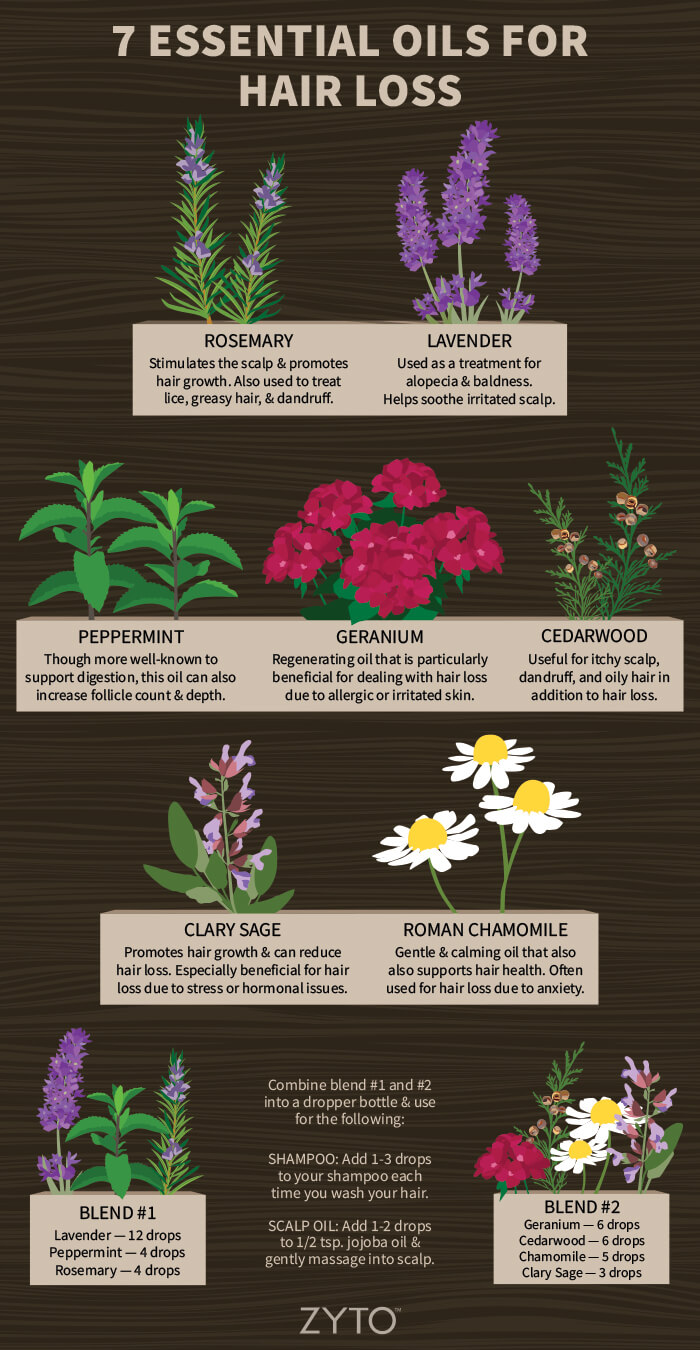Hair loss is more common than you may think. It doesn’t matter if you’re a man or woman, young or old, tall or short. The truth is that anyone can experience hair loss, regardless of their age, gender, and stature.
The good news is that there may be some natural ways you can help slow it down and possibly even promote hair growth. Besides maintaining good health by focusing on diet, exercise, and lowering stress, essential oils for hair growth may be beneficial as well.
Top essential oils for your hair
As a certified herbalist, I’ve found that certain essential oils can improve scalp health and even help to regrow hair. Here are the top 7 essential oils for hair growth I would recommend based on research and personal experience.
-
Rosemary
Rosemary can be beneficial for many issues, including skin and hair care. It has traditionally been used for lice, greasy hair, and dandruff, as well as promote hair growth and stimulate the scalp.
As a regenerating oil, rosemary is useful for maintaining hair health in general. In fact, a 2012 study tested the usefulness of rosemary leaf extract in promoting hair growth, and the results were promising. The study found that the rosemary extract did in fact promote hair regrowth in mice.
Additionally, another study found that an application of rosemary oil led to a significant increase in hair count after 6 months.
It’s important to note that due to its high 1,8-cineole content, you should always dilute rosemary in a carrier oil and avoid getting it near the face of children or infants.
-
Lavender
Lavender is widely considered one of the most versatile essential oils, being extremely helpful for numerous issues. It can be useful for most ailments because of its balancing and synergistic properties. Therefore, it should come as no surprise that lavender is also considered one of the most beneficial essential oils for promoting hair growth as well.
A a very soothing and calming oil, lavender can help with an irritated scalp. It has long been used for alopecia and baldness. In fact, a study conducted in 2016 found that lavender oil increased the number of hair follicles and hair follicle depth on mice. And since lavender is considered one of the safest essential oils, just about anybody can use it!
-
Peppermint
It may surprise you to find peppermint on this list. Traditionally, peppermint essential oil has been most commonly used for gastric and digestive issues. However, it is a very stimulating oil that can not only perk you up mentally, but also promote hair growth.
Research has found that peppermint enhances vascular formation in the dermal papilla, which may help with hair growth in its early stages. According to a 2014 study, use of peppermint oil on mice led to an increase in follicle count, increase in follicle depth, and a thickened dermal layer after 4 weeks.
In addition to helping with hair growth, peppermint may help to reduce dandruff as well.
Due to its high menthol content, you should always dilute peppermint oil thoroughly and keep it away from the face of young children or infants.
-
Geranium
Because it is another regenerating essential oil, geranium can be helpful in stimulating hair growth as well. One study found that geranium promotes hair growth by regulating growth factors and cellular response.
Comprised of mostly citronellol and geraniol, this oil has a high count of monoterpenes, which are considered immune stimulants and general tonics. It is also commonly used in skin care due to its anti-inflammatory properties and its abilities to balance out skin types. This also makes geranium beneficial to use when dealing with hair loss due to allergic or irritated skin.
-
Cedarwood
Cedarwood essential oil can also be beneficial when dealing with hair loss. It can be useful for multiple skin and scalp issues, including itchy scalp, dandruff, oily hair, and hair loss. Along with having anti-inflammatory and anti-fungal properties, this oil promotes blood circulation, which can improve nutrition absorption in the roots of the hair. https://vedix.com/blogs/articles/cedarwood-essential-oil-for-hair
In 1998, researchers published a study on patients who suffered from alopecia areata. The researchers used an essential oil blend of cedarwood, rosemary, lavender, and thyme on participants. The participants used the blend on their scalp every day for 7 months. The results showed that 44% of the patients found improvement with their alopecia after using the essential oil blend.
-
Clary Sage
Another essential oil to consider when dealing with hair loss is clary sage. Not to be confused with common sage, clary sage is a stimulating oil and can be used to both reduce hair loss and promote hair growth. Because it is commonly used to regulate hormones and stress, it can be especially beneficial for hair loss that is due to stress or hormonal issues.
Please note that you should not use clary sage when drinking alcohol, if you are pregnant or breastfeeding, or if estrogen levels need to be monitored.
-
Roman Chamomile
Gentle and calming, chamomile has been used for numerous issues for decades. While it’s most known for its calming and gastric properties, it is also used to support hair health.
Because of its ability to help with stress and anxiety, chamomile can be useful for hair loss due to anxiety or nervous disorders. It is also very calming to the skin and helpful when dealing with irritated, allergic, or itchy skin and scalp. It may be beneficial in reducing hair loss. Chamomile is often used in hair care and is even thought to help lighten hair color. Like lavender, chamomile is considered a safe oil and can be used on most people.
How to mix essential oils for hair growth and thickness
It’s important to remember that a little goes a long way with essential oils. Because they are highly concentrated substances, you only need to apply a small amount. If not diluted properly, essential oils can cause irritation and sensitization, so make sure to always dilute them accordingly.
Here are two blends that I’ve created for hair loss. Feel free to use just one blend or both, the choice is yours.
Hair-growth blend #1
- Lavender–12 drops
- Peppermint–4 drops
- Rosemary–4 drops
Hair-growth blend #2
- Geranium–6 drops
- Cedarwood–6 drops
- Chamomile–5 drops
- Clary Sage–3 drops
Thoroughly combine each of the blends and store them in a dropper bottle. Use one or both of them to promote hair growth in one of the following ways…
Shampoo
Add 1-3 drops to your shampoo each time you wash your hair. Gently massage into hair and scalp and rinse as normal.
Scalp oil
Add 1-2 drops of essential oil blend to ½ tsp. jojoba oil and gently massage into scalp. Leave on scalp or shampoo if needed.
Potential risks and side effects
Essential oils are typically well-tolerated, so long as they’re diluted properly. It is recommended to dilute all essential oils (even milder ones like lavender) in a carrier oil such as fractionated coconut or jojoba oil.
The American College of Healthcare Sciences recommends adding 25 to 50 drops (about 1/2 to 1/4 teaspoon) of carrier oil per drop of essential oil used. For stronger oils like peppermint and rosemary, 100 drops per drop of oil is recommended.
Other natural options for hair loss & regrowth
The key with using essential oils for hair growth is to be consistent and to be patient. However, you may also want to combine essential oils with other hair-loss remedies for even better results. Some of these include:
- Onion juice
- Aloe Vera
- Scalp massage
- Pumpkin seed oil (orally)
- Vivascal or Nutrafol
- Light cap therapy
- Horsetail
In addition to these options, try incorporating these top foods for hair growth into your diet.
As always, make sure to check with your doctor before adding any of these hair-loss remedies to your routine.

 About Nicole Stine
About Nicole Stine
Nicole Stine is a certified herbalist who has numerous aromatherapy and natural health certifications. She is passionate about using herbs and essential oils safely and thoroughly enjoys researching and writing about natural health, as well as creating her own formulations.